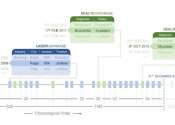A market is any one of a variety of different systems, institutions, procedures, social relations and infrastructures whereby persons trade, and goods and services are exchanged, forming part of the economy. It is an arrangement that allows buyers and sellers to exchange things. Markets vary in size, range, geographic scale, location, types and variety of human communities, as well as the types of goods and services traded. Some examples include local farmers’ markets held in town squares or parking lots, shopping centers and shopping malls, international currency and commodity markets, legally created markets such as for pollution permits, and illegal markets such as the market for illicit drugs.
In mainstream economics, the concept of a market is any structure that allows buyers and sellers to exchange any type of goods, services and information. The exchange of goods or services for money is a transaction. Market participants consist of all the buyers and sellers of a good who influence its price. This influence is a major study of economics and has given rise to several theories and models concerning the basic market forces of supply and demand. There are two roles in markets, buyers and sellers. The market facilitates trade and enables the distribution and allocation of resources in a society. Markets allow any tradable item to be evaluated and priced. A market emerges more or less spontaneously or is constructed deliberately by human interaction in order to enable the exchange of rights (cf. ownership) of services and goods.
The historical origin of markets is the physical marketplaces which would often develop into small communities, towns and cities.[citation needed]









